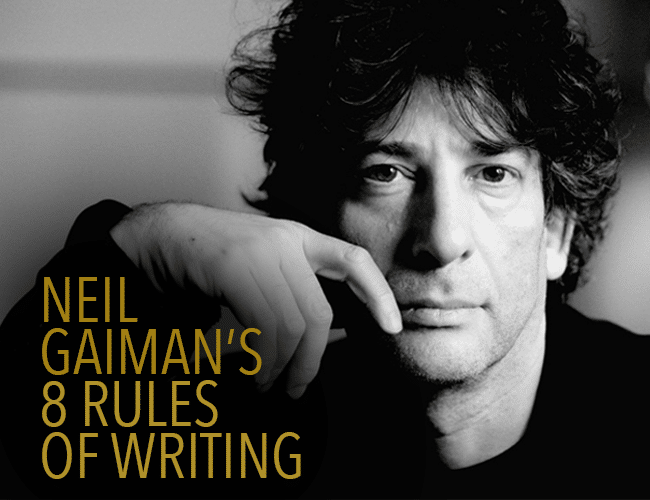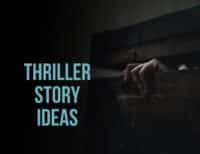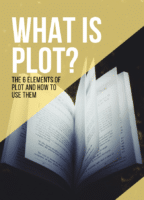Some of you may have noticed that the esteemed Mr. Gaiman is my favorite living author. Even if he's not everyone's cup of tea, it's hard not to notice him: books, graphic novels, award after award—the man is prolific and very good at what he does. So when I realized he had eight rules of writing, you better believe I beelined to read them. And guess what? They're fantastic … with a few explanations. Read on for more.

Neil Gaiman's 8 Rules of Writing
Without further ado, here are Mr. Gaiman's eight rules:
Rule One
Write.
Seems like a given, doesn't it? Well, it isn't; many of us want to write or think about writing or plan to write, but don't actually write.
Rule number one to be a writer is to write. Even if you feel you're not ready.
Especially if you feel you're not.
Rule Two
Put one word after another. Find the right word, put it down.
This can be challenging. Sometimes, you can't find the right word until later. However, if we stop to try to find that right word, we often freeze.
Okay, I freeze. I sit there looking through dictionaries and wikis and thesauruses, trying to find just the right word. And when I do that, I'm not writing.
Stick with the first half of this rule. Put one word after another—and don't stop.
(Quick tip: need to figure out that word for later? Put it in brackets, like this: “In the middle of this sentence, I could not come up with the [] word that I needed.” Then later on, you can search for the brackets [] and find it.)
Rule Three
Finish what you’re writing. Whatever you have to do to finish it, finish it.
Yes.
Yes.
Yes.
I KNOW how hard this is. When it just isn't right yet, we can go a little crazy. Hear me out: it doesn't matter what you have to do to reach that final page.
It's okay if you have to rip it out and fix it later. If there's an ending, it can be fixed.
Rule Four
Put it aside. Read it pretending you’ve never read it before. Show it to friends whose opinion you respect and who like the kind of thing that this is.
This one's actually a bunch of rules, but they're important.
1. Put it aside. If you don't put the thing down for at least two weeks, you won't be able to read what's actually there. Author-brain is an unfortunate malady that forces us to see what we wish was there, not what is there.
2. Read it pretending you've never read it before. Essential. Your readers won't have read it before. If something isn't clear to them, you need to fix it.
3. Show it to friends whose opinion you respect and who like the kind of thing that this is. YES! Show it to people who will understand what you're trying to do. This may not be family; this may not be your local group of friends. This WILL be a good writing group, when you find one—folks who know what an unfinished, unpolished story looks like, and because they can see what you're trying to do, can help you get there. (I belong to this writing group, and I love them to death for that reason.)
Rule Five
Remember: when people tell you something’s wrong or doesn’t work for them, they are almost always right. When they tell you exactly what they think is wrong and how to fix it, they are almost always wrong.
This is a hard one to wrap your head around, but very often, it's true.
Your average reader can tell when something is off. They know they didn't connect with that character, or didn't understand that plot point, or had no idea where you were going with that tangent.
Listen to that. If your reader's lost, then something needs elucidation—but you're the writer, and that means you know your piece better than they do. Trust your gut when it comes to fixing the problem; just pay attention when your reader says there's a problem to begin with.
Rule Six
Fix it. Remember that, sooner or later, before it ever reaches perfection, you will have to let it go and move on and start to write the next thing. Perfection is like chasing the horizon. Keep moving.
This goes back to rule one: write. It also goes back to rule three: finish it. See the theme?
Rule Seven
Laugh at your own jokes.
Ever heard, “No tears in the writer, no tears in the reader”? It also applies to laughter.
If you don't think what you're writing is funny, why would anyone else? But it goes deeper than that: writing things that make you laugh isn't just for your reader. It's also for you.
If you're able to laugh at your own jokes, then you haven't fallen out of love with your story. Stay in love. Laugh. It's good for the soul (and whatever you're writing).
Rule Eight
The main rule of writing is that if you do it with enough assurance and confidence, you’re allowed to do whatever you like. (That may be a rule for life as well as for writing. But it’s definitely true for writing.) So write your story as it needs to be written. Write it honestly, and tell it as best you can. I’m not sure that there are any other rules. Not ones that matter.
That's a mouthful, isn't it? It breaks down nicely, though:
1. Write with confidence.
Sometimes you have to fake that confidence, and that's okay, too. Don't write letting your fears drive.
2. Write it honestly and tell it as best you can.
That means the best you can at that moment in time. You owe no apologies for whatever you create. Sure, you'll write better later; that doesn't make what you did before embarrassing in any way. It was what you had to give at the time.
Just as you (hopefully) wouldn't shame a small child who's still learning their ABCs, you shouldn't shame yourself as you're learning to write.
The Bottom Line
If I were so bold as to sum up Gaiman's eight rules of writing in as many words, it would be this:
Do your best.
Write.
It is worth it.
Does your favorite author have “rules of writing?” Share in the comments.
PRACTICE
Pick one of these rules. Set a timer for fifteen minutes, and write, applying that rule with all your might. When you're done, share your practice in the comments. Don't forget to comment on three other writers' practice, as well!







Hey, ‘Frothy,’ thanks for this — frothy reminds me of my favourite advice from the author Brenda Ueland: “Be careless, reckless! Be a lion, be a pirate, when you write.”
Arrrrrr!
…me hearties!
Haha! Thank you. 🙂 And I like her, too!
Thanks for the introduction to Brenda Ueland, PJ!
Brenda Ueland’s little book, “If You Want to Write,” has lived by my bedside for years. It’s a treasure.
Great to know. A book I will definitely pick up!
A group of warriors gather around a campfire, talking about their latest victory. And how it will be their one more step closer to their goal of unifying this war torn country. Tho their leader make some of them nervous. Like their was a time she recruited a vile man known for underhanded schemes, and backstabbing. But when ever they look at each other, he gave her a bitter glare but she just smiles at him. Some thought it was flirtatious. It wasn’t. It was a mocking grin. Thankfully they don’t have to deal with him and longer, as the last words he said before running into her sword (which just so happens to be raised) “My future is my own! “
Ooh, an exciting tidbit! Which rule did you apply?
The first one. I just write.
This extremely good advice. Excellent! They are burned into my cerebellum.
I agree! I really love these “rules.”
My most discouraging question has been: “Why do you want to write?”
It has taken me years to finally be able to tell people, “I’m a writer!”
My book is on the way! One last long chapter of my life!
Excellent, Mary! I’m so glad you’re figuring out that answer!
I don’t think I was ever asked that question, but I have found the need to answer it in a world of reader-driven writing. This is especially evidenced by fanfiction communities, or just writing that’s posted on the internet, where I have seen people begging for more, more, MOAR, regardless of whether the author planned or even wants to continue something. For that reason, primarily, I have deemed/discovered/decided that I write because I want to, for myself, not for the readers. Do I love and appreciate any readers I have, and do they encourage me to keep writing? Heck yes, but they’re not my primary reason for writing. If I write because I long for someone to read what I wrote, I might be disappointed. If instead I write because I want to and I like writing and the accomplishment that comes with finishing a piece, I will have satisfaction as a writer regardless of whether people read it. Or even regardless of whether people /like/ it. Because I didn’t give them control over my enjoyment of my writing.
These are easy rules to follow and great advice. I would add read a lot like Stephen King suggests. I agree with PJ down below about Brenda Ueland. She has been my favorite writer from the beginning of my journey to become a writer. She is encouraging and practical. Thank you, Ruthanne for this post. I had not heard of Mr. Gaiman. 🙂
Fantastic references! I love Stephen King’s ON WRITING, too!
Thank you!
Just Excellent !!! (with a capital ‘E’)
I will read ’em over and over again until they are burned into my peon brain!
I’m so glad this helps! I know it helps me.
Having followed rule number 3, I finished the revamped first chapter of a WIP that originally stalled in July. Below is the opening segment.
Alex Tomassini could not focus. He sat in the front row of the large classroom and half paid attention to the lecture on variables. He jotted down the occasional note to avoid drawing suspicion, but as he stole glances out the window to Posey’s Pitch in the distance, his mind turned to numbers of a different sort. The number of minutes left in the class (Seven, though it felt like seventy). The number of feet between him and the pitch. The number of goals he would score this season. The number of times he would imagine himself hoisting that championship trophy. These were the numbers that mattered, not the equations on a textbook page.
Fantastic piece…Thanks a lot Ruthanne…!!! For me…It came at the right time…!!!
It is inspiring. Actually I always plan to write, but not put my thoughts on paper with lots of excuses .
Thanks for sharing this great article.
happy writing
Thank you. I have what I need to keep going. Works of progress. ⭐⭐
This is a doozy. It might be the best short list of writing tips I’ve ever come across (and I’ve been keeping a file for years)– and your commentaries add just the right amount of clarity to make each approachable without stepping on the master. Thanks!
All very good advice. I try to write honestly, the way I feel about memories. This is the beginning of my first chapter:
I look at my map for a route to Beechwood Avenue as I plan to walk to the end, to Beechwood Cemetery to see where my sister is buried. It’s a Friday afternoon late in September with a bright blue sky and white puffs of clouds drifting by – a sharp, clear, perfect Ottawa day. Walking through Rockcliffe Park the Peace Tower carillon noon concert is playing. The spicy sweet smell of the maples leaves rustling under foot fills the air.
Leaving the park, I walk along Lisgar Road to Rideau Terrace, streets so familiar, but their names forgotten. I check my directions, noticing this part of the city is called Lindenlea. Walking down Springfield, I recall this is the corner where the riding stable used to be.
It is a very long walk. I’ve never been this far before. As I walk, I think of my sister and my earliest memories. The old newspaper clippings I found in my mother’s personal collection read:
Thank you for sharing this sensible but rich advice. It’s reassuring to remember that all writers and creators struggle with the same issues. I find pleasure in the struggle. I love words and puzzles and trying to arrange them in a logical sequence. It’s cheap therapy. When I ask myself why do I write I answer: to recover, uncover and discover.
Thank you. It helps a lot ! Take confidence and enjoying the process is very very important for me. I like the way you deal with the b-readers !
Many a times i have written -without writing trying to find the right word , other times i just wrote what i thought -big difference to me
Myrah slowed when she reached the grove. The
portal was open. “Cayne!” she said, but heard nothing save the humming melody
coming from the portal. After ensuring it would remain open, she dashed in.
She entered into a meadow filled with exotic
plants of unusual design, native only to this place. She’d been here once,
years before she’d taken up the position of magical adviser. How ironic that
this place, once her refuge, now served as a prison. She cast a barrier about
the entrance, ensuring none but she could leave
She saw him by the fountain at the meadow’s
edge. She rushed toward him, the boy turning at her approach.
“Cayne,” she said when she caught up to him,
“what are you doing here?”
“I came to find Father.” he said, his eyes
still full of wonder. She’d felt the same when she first discovered this place.
“Your father is back at the castle, worried
for your safety. As am I.” she said, puzzled by his words.
He shook his head. “Father is here.” He
said. Before she could reply, a rustling of leaves drew her attention. A figure
walked towards them. Myrah started as he drew near. She placed herself between
Cayne and the interloper.
He stopped when he saw her hands crackling
with lightning. “Myrah. You should visit more often.”
“Stay back, Caedis!” she said, the lightning
intensifying. His piercing blue eyes flickered, but he appeared more amused
than threatened. “You truly think I would harm my own son?”
She started at this, but kept her
concentration. “Your son?”
“Come now,” Caedis said, “you don’t believe
that oaf you call husband is his father, do you?”
“He is not yours!” she retorted hotly.
“He has my blood.” Caedis said, his calm
voice further irritating her. “How else could he have reached me here?”
At this, she unleashed the power building
within her, a powerful burst of lightning arcing towards Caedis. He simply
extended a hand, summoning a swirling vortex that absorbed the attack.
“You still think of me as a monster, after
all these years.” Caedis said, shaking his head.
“You don’t consider murdering thousands to
increase your power monstrous?“ Myrah asked.
Caedis looked at young Cayne, clutching his
mother’s leg, his confusion manifest. “Cayne, your mother and I need to talk.
Why dn’t you go play with Belepha?”
As if in reply, a sprite emerged from a
nearby hedge. Myrah tensed, but Caedis merely smiled. “A timid creature, but
she means no harm. I’m surprised you never noticed her.”
Myrah was surprised as well. She’d never
seen the creature during her time here. The sprite’s face bore the innocence,
curiosity, and timidity of any child.
Cayne looked at his mother, who nodded her
consent. The boy ran off with his new friend.
“Now we can talk civilly.” Caedis said,
sitting nonchalantly near the fountain. Myrah remained standing.
“Just when I thought after all these years
you had gained a shred of dignity. I will not let you entrance him with your
lies.”
“He has the gift, but requires training for
it to mature.” Caedis said, ignoring her outburst.
“How did you know about him?” she asked.
“I saw through his eyes as he came into this
world.” Caedis replied. “I saw you through his eyes.” Caedis’ eyes took on a
faraway look. “I don’t hate you for your actions, however misguided they were.”
These are also my rules. Thank you.
Here’s me just riffing without thinking for 15 minutes…..No editing, no over-thinking, just writing…
The thing was, he knew she was right.
He knew that the best way to end was to begin.
Whatever was back there, in those boxes, was lost to everyone who had originally sent them or waited for them to arrive.
They had moved on, some through death or an address change.
Some simply changed their mind and didn’t want whatever was in there.
And it was sad in a way.
Maybe in there was the thing that would have changed someone’s life or moved it in a certain direction or KEPT it from moving in a certain direction.
Maybe in those boxes was a letter that said, “ I love you come back” or “ I hate you, don’t EVER come back.”
Maybe there was a box of baby photos that someone had sent their mom or their dad or their kid’s dad:” See? He looks like you….He has your eyes and your smile.”
Maybe there was the acceptance letter to a university that was never delivered or a letter saying, “ Yes, we’ll publish that book.”
Back there were possibilities and history and a thousand collected years of something.
And he and Cait were going to plunder all that and stick it on eBay.
And he felt bad that he didn’t feel bad about it.
There were things he could have said to rationalize what they were doing, but he found he didn’t have to.
Waiting for qualms, rhe realized that he didn’t feel any.
This was just making money where there was money to be made.
Maybe there was actually something in there life-changing for him.
It took him a second to realise that he hadn’t thought him and her but there it was.
No qualms, no guilt.
She was fun.
She was pretty and god knows he enjoyed them sleeping together.
But he knew that one day, there’d be something, some comment and then he and she would no longer be heandshe, the way she thought they were.
He would go one way and she’d go another.
For a second, he had regrets but he realized that all he would miss were the visceral things, the physical touch of her on him, the way her hair smelled after they showered together, the way her wet skin stuck on his during their tumbles in bed, the way she complained that she’d have to make up all new sheets now.
Maybe there were things about her that he’d miss.
Maybe there was a moment where his life could go in a direction that was unexpected to him.
Maybe she was the package.
Jon shook his head at that.
He wasn’t one for metaphor and symbolism or believing in fate or whatever crap people seemed to think ruled the universe.
There was no over-arching pattern to anything: things happened because things happened.
Sometimes it made your life better and sometimes it didn’t.
Nothing happened for a reason, he thought.
Hell, more than that, he knew.
Yet, here he was was, thinking about the spot on the side of her neck, where those faint red hairs tickled his mouth when he kissed her there.
Great stuff. I want to read more of it.
Hello Mike. I enjoyed reading your story and took tips from how you ‘show’ and don’t ‘tell’. Really good. Thanks for sharing.
Best of luck with your writing.
I like Rule Seven.
I recently had this mad idea for a comic fantasy novel and wrote the whole thing in a fit of giggles (yes, truly!) as I found what I was doing so very, very funny. My humour, I should say.
Well, it is now finished and some of the willing readers (family, friends, that sort of type) have read it and not turned around and given it the kiss of death for a comedy by telling me, “It is NOT funny.”
While the humour isn’t all belly laughs by all means, I think it meets its objective–poking fun at the fantasy genre and other things besides (including self, I should add as the “author” has a cameo role in his own story (kinda complicated to explain, really; but it works).
So in terms of rules, I like these eight 🙂
Makes me want to keep these pinned up next to my work area. Thanks for sharing!